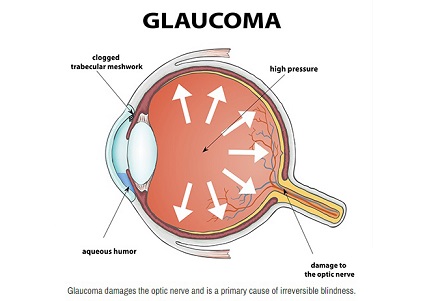Glaucoma News: Chinese Scientist Find Gut Immune β7+ CD4+ T Cells Contribute To Progressive Retinal Ganglion Cell Damage In Glaucoma
Nikhil Prasad Fact checked by:Thailand Medical News Team Sep 19, 2023 1 year, 6 months, 4 weeks, 1 day, 1 hour, 20 minutes ago
Glaucoma News: Glaucoma, a devastating eye disease and a leading cause of irreversible blindness, has long stymied medical researchers due to its complex and elusive pathogenesis. Characterized by the gradual deterioration of retinal ganglion cells and the optic nerve, glaucoma is a condition with no known cure. However, treatments have been developed to slow its progression, primarily by targeting elevated intraocular pressure (EIOP), one of the hallmark symptoms of the disease.

Recent research from a collaborative team of medical scientists at the University of Electronic Science and Technology of China, along with colleagues from the Army Medical University and the Luzhou Maternal and Child Health Hospital, has uncovered a novel connection between gut-immune β7+ CD4+ T cells and progressive retinal ganglion cell damage in glaucoma. Their groundbreaking study findings have shed light on a previously overlooked facet of glaucoma pathogenesis, emphasizing the potential role of the immune system in this enigmatic disease.
The Enigma of Glaucoma
Glaucoma has long puzzled medical professionals, primarily because its root causes remain elusive. Although therapies targeting EIOP have been effective to some extent, they do not always halt disease progression. This knowledge gap has prompted researchers to delve deeper into the mechanisms underlying this complex disease.
The Role of CD4+ T Cells
Previous studies and
Glaucoma News reports had hinted at the involvement of T cells in glaucoma-related damage, but the specific mechanisms had remained unclear. The recent study conducted by the Chinese medical scientists sought to uncover the potential role of CD4+ T cells, a subset of T cells, in glaucoma.
To investigate this, the research team analyzed blood samples from 519 patients with glaucoma. Surprisingly, they discovered a correlation between higher levels of CD4+ T cells and increased damage to the eyes in these patients. This revelation marked a significant step toward unraveling the mysteries of glaucoma pathogenesis.
Integrin β7: The Key to Retinal Damage
Further investigation into the behavior of CD4+ T cells in mice revealed an intriguing link between these immune cells and a protein known as integrin β7, encoded by the ITGB7 gene. The research team found that CD4+ T cells in mice expressed integrin β7 in the gut, creating a unique avenue for potential involvement in retinal damage.
Moreover, CD4+ T cells appeared to undergo a transformative process in the gut, enabling them to utilize integrin β7 to access the retina and initiate attacks on retinal ganglion cells when transported through the bloodstream. This discovery raised important questions about the gut's role in glaucoma progression.
Gut-Immune Cells and Glaucoma Damage
To delve deeper into the link between CD4+ T cells and glaucoma damage, the study team conducted experiments on mice. By administering antibodies that inhibited the interaction of CD4+ T cells with a specific protein called M
AdCAM-1, they were able to reduce inflammation within the eye and mitigate retinal damage.
These findings offered compelling evidence that gut-immune CD4+ T cells play a significant role in glaucoma pathogenesis. Furthermore, the study underscored the pivotal role of the immune system in the development and progression of diseases like glaucoma.
The Gut-Retina Axis: A Key Discovery
In addition to linking gut-immune cells to glaucoma damage, the research highlighted the emergence of the "gut-retina" axis as a crucial factor in glaucoma disease progression. This novel concept implies that events occurring in the gut can have far-reaching consequences in the retina, particularly in the context of immune cell behavior and their impact on retinal ganglion cells.
The Progressive Phase of Glaucoma
The study also illuminated the progressive phase of glaucoma, during which β7+ CD4+ T cells infiltrate the retina by inducing the expression of MAdCAM-1 on retinal endothelial cells. This phenomenon was observed in a glaucoma mouse model triggered by elevated intraocular pressure. Notably, MAdCAM-1 expression was minimal in the retinas of healthy mice, emphasizing its significance in glaucoma-related damage.
Blocking MAdCAM-1: A Promising Intervention
One of the study's key findings was the potential therapeutic approach of neutralizing MAdCAM-1 with specific antibodies. By doing so, the researchers were able to ameliorate the loss of retinal ganglion cells and reduce glial activity in mice with glaucoma. This breakthrough suggests that interventions targeting the gut-retina axis could hold promise for slowing or preventing glaucoma progression in the future.
Gut-Homing CD4+ T Cells: Transcriptional Reprogramming
Further investigation into the behavior of gut-homing β7+ CD4+ T cells revealed that they undergo transcriptional reprogramming in the gut. This transformation was characterized by up-regulated pathways related to autoimmune diseases, responses to bacteria, mucosal immunity, and glial activity. Consequently, gut-homing β7+ CD4+ T cells gained the competence to induce the expression of retinal MAdCAM-1 and traverse the blood-retina barrier.
Conclusion
The recent study conducted by Chinese medical scientists has significantly advanced our understanding of glaucoma pathogenesis by unveiling the role of gut-immune β7+ CD4+ T cells and their connection to progressive retinal ganglion cell damage. These findings not only shed light on the enigmatic nature of glaucoma but also emphasize the importance of the gut-retina axis in disease progression. Moreover, the potential therapeutic intervention involving the blockade of MAdCAM-1 opens up new avenues for the development of treatments aimed at halting or slowing the progression of this devastating eye disease. As the scientific community continues to unravel the complexities of glaucoma, these discoveries offer hope for the millions affected by this blinding condition.
The study findings were published in the peer reviewed journal: Science Translational Medicine.
https://www.science.org/doi/10.1126/scitranslmed.adg1656
For the latest
Glaucoma News, keep on logging to Thailand Medical News.
